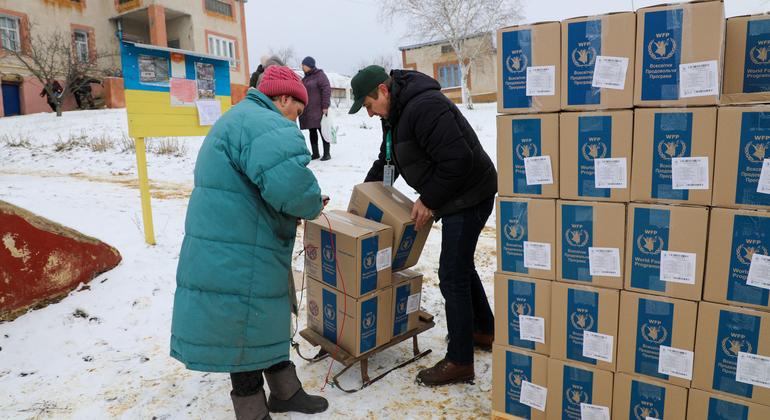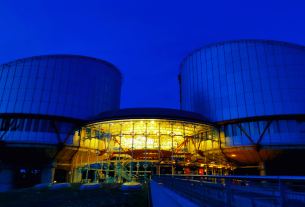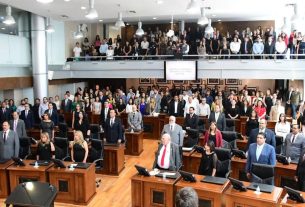On the opening day of the Human Rights Council in Geneva, the Secretary-General rounded on “warmongers who thumb their nose at international law, international humanitarian law and the UN Charter”.
To date, Ukraine has seen more than 12,600 civilians killed, many more injured and entire communities reduced to rubble, Mr. Guterres told the UN’s top human rights body. “We must spare no effort to bring an end to this conflict, and achieve a just and lasting peace in line with the UN Charter, international law and General Assembly resolutions, he insisted.
“One by one, human rights are being suffocated,” Mr. Guterres continued, singling out the “autocrats crushing opposition because they fear what a truly empowered people would do”, amid “wars and violence that strip populations of their right to food, water and education”.
Turning to the “precarious” ceasefire in Gaza, the UN chief insisted that a resumption of hostilities must be avoided at all costs for the sake of the enclave’s people who have endured 15 months of constant Israeli bombardment. Mr. Guterres also expressed deep concern about rising violence in the occupied West Bank by Israeli settlers – “and other violations, as well as calls for annexation”.
“It’s time for a permanent ceasefire, the dignified release of all remaining hostages, irreversible progress towards a two-State solution, an end to the occupation, and the establishment of an independent Palestinian State, with Gaza as an integral part.”
Silence the guns
In a wide-ranging speech to the world’s top human rights forum, the UN Secretary-General also called for diplomacy and dialogue to help resolve horrific, ongoing rights violations from the Sahel to Myanmar, Haiti and eastern Democratic Republic of the Congo.
“We see a deadly whirlwind of violence and horrifying human rights abuses, amplified by the recent M23 offensive, supported by the Rwandan Defense Forces – as more cities fall, the risk of a regional war rises,” Mr. Guterres said. “It’s time to silence the guns; it’s time for diplomacy and dialogue.”
And amid growing intolerance towards many of society’s most vulnerable and marginalized people – from indigenous peoples, to migrants, refugees, the LGBTQI+ community and persons with disabilities – the UN Secretary-General also criticized the voices of “division and anger” for whom human rights threaten their quest for “power, profit and control.”
Secretary-General António Guterres addresses the opening of the 58th session of the Human Rights Council.
Mulitlateralism under strain
Echoing the UN chief’s concerns that human rights are “being pummelled hard” today, putting at risk 80 years of multilateral cooperation embodied by Organizations, UN human rights chief Volker Türk warned that the international system “is going through a tectonic shift, and the human rights edifice we have built up so painstakingly over decades has never been under so much strain”.
Beyond Ukraine, where Russian attacks have created “wanton destruction”, Mr. Türk told the Council’s Member States that the suffering borne by Gazans and Israelis since the Hamas-led attacks that sparked the war in October 2023 had been “unbearable”.
The UN rights chief also repeated his call for an independent probe into grave violations of international law “committed by Israel in the course of its attacks across Gaza, and by Hamas and other Palestinian armed groups”.
Mr. Türk also condemned as “completely unacceptable” any suggestion that people can be forced from their land – amid proposals floated by the United States that Gazans should be resettled outside the devastated Strip.
His comments came on the opening day of the Human Rights Council in Geneva which meets in three scheduled sessions throughout the year. March is traditionally the “high-level” session where top national representatives rub shoulders at the Palace of Nations in Geneva.
‘Strongmen and oligarchs’ on rise
In a call to action amid rising social tensions linked to widening inequality, disinformation and hate speech spreading online, the High Commissioner for Human Rights highlighted that these problems were happening while the world’s richest one per cent control more wealth than the majority of humanity added together.
“The global consensus on human rights is crumbling under the weight of authoritarians, strongmen and oligarchs,” Mr. Türk insisted. “By some estimates, autocrats now control around one-third of the world’s economy – more than double the proportion 30 years ago,” he continued.
Earlier, the UN Secretary-General issued a similar warning about toxic social media engagement that is already undermining people’s human rights. “Verbal violence online can easily spill into physical violence in real life,” he told the Council, as he cautioned against “rollbacks” on online fact-checking and content moderation, which will likely promote “more hate, more threats, and more violence”.
And he added: “Make no mistake. These rollbacks will lead to less free speech, not more, as people become increasingly fearful to engage on these platforms.”
Nigh-on six weeks of debates are slated to discuss emergencies in around 40 countries – from Belarus to DR Congo, DPRK/North Korea, Haiti, Sudan, Ukraine and more – along with thematic issues and some 80 reports from top independent rights experts and the UN human rights office, OHCHR – on disability rights, genocide, children in armed conflict and torture, among others – until the 58th session ends on Friday 4 April.
The Human Rights Council is the world’s principal body for discussions and action on human rights. It was founded in 2006 and has 47 Member States, although all 193 countries belonging the UN can take part as observers.



